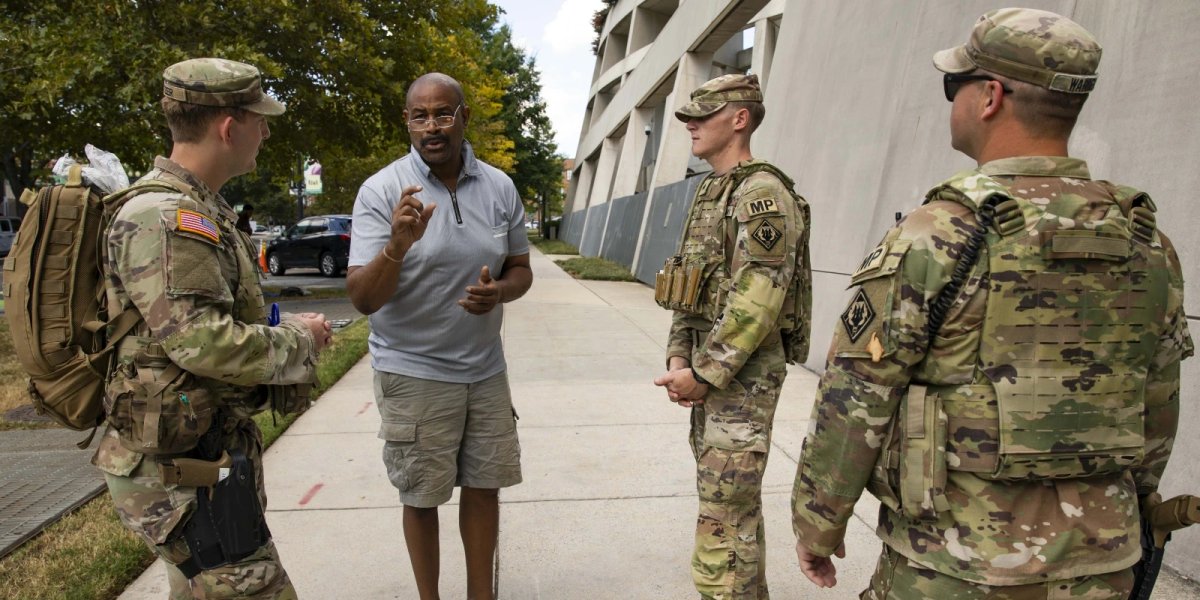NATIONAL GUARD'S ROLE IN U.S. COMMUNITIES: PUBLIC OPINIONS

Picture this: You step outside your house expecting nothing more than your mailman, only to find uniformed National Guardsmen pruning bushes and picking up litter down the block. At first glance, it looks like a surprise neighborhood clean-up crew—until you notice the rifles over their shoulders. That’s the unexpected scene unfolding in cities like Washington, D.C., where Guardsmen are swapping drills for trash bags. For veterans, active‑duty members, and military families, it’s a jarring mix of civic service and military presence—all wrapped into one.
When most people picture the National Guard rolling into town, they expect disaster relief, security support, or crowd control. What they don’t usually imagine? Soldiers raking leaves in the park, hauling trash bags down city sidewalks, or power-washing graffiti off a wall. Yet in Washington, D.C., that’s exactly what’s been happening—and residents are divided over whether it feels like a welcome helping hand or an unsettling show of force.
For veterans, service members, and military families, this moment raises important questions: How are troops being used, what does it mean for readiness, and how do civilians really feel when uniforms show up in unexpected roles?

National Guard Community Projects: Public Sentiment
From the cherry blossoms at the Tidal Basin to Union Station’s sidewalks, Guard members are doing landscaping and cleanup.
Some residents see the effort as a much-needed service in understaffed municipalities, while others feel uneasy about armed troops doubling as maintenance workers.
Many locals describe the troops as “very nice men” offering a weird kind of comfort.
Others, though, say it feels like living inside Call of Duty—militarized, unfamiliar, and maybe a little over the top. It reinforces a delicate balance: reassurance to some, intimidation to others—a classic civil‑military tug.
Training or Trash Pickup?
Service members share this pride, yet they also point out that every hour spent hauling trash is an hour not spent on combat or specialty training.
Veterans warn of a slippery slope: what starts as community service could become normalized, shifting focus away from readiness and toward domestic tasks.

National Guard Deployment in California: Political Tensions
In June 2025, President Trump amplified the tension by federalizing up to 4,000 California National Guard troops and deploying about 700 Marines to Los Angeles amidst immigration protests—without the governor’s consent. He cited the need to “liberate” the city and curb unrest.
California promptly sued. A federal judge temporarily restored the Guard to state control, but a Ninth Circuit court issued a stay, allowing the deployment to continue—for now.
What Are People Saying?
Nationwide polls show Americans divided.
Support ranged from 34% to 48%, while opposition was between 41% and 47%. Around 58% of Californians disapproved.
Political alignment played a big role—Republicans tended to back the move while Democrats mostly opposed it.
Newsom and other Democratic leaders called the deployment “inflammatory,” “reckless,” and a blur of military and law enforcement. They warned it undermined state sovereignty and exceeded legal bounds.
Why it Matters
That clash in California underscores how Guard deployments—even for civic tasks—can ignite serious debates about civil rights, federal power, and how—and where—the military should show up in everyday life.
When Guard troops turn into de facto public works staff, it reshapes both community perception and Guard identity. The California saga shows how quickly local support can turn into legal and constitutional flashpoints.
National Guard's Role in Disaster Relief: Community Perspectives
So, are these troops your new friendly cleanup squad, or part of a larger—and more contentious—redefinition of their mission? When a uniformed soldier picks up a trash bag instead of a rifle, what lines are being redrawn? The real question we’re left chewing on is simpler yet heavier: At what point does ‘helping out’ drift into something more complicated? And once that line is crossed, can we draw it back?
Suggested reads:
Join the Conversation
Natalie Oliverio
Veteran & Senior Contributor, Military News at MyBaseGuide
Natalie Oliverio is a Navy Veteran, journalist, and entrepreneur whose reporting brings clarity, compassion, and credibility to stories that matter most to military families. With more than 100 publis...
Natalie Oliverio is a Navy Veteran, journalist, and entrepreneur whose reporting brings clarity, compassion, and credibility to stories that matter most to military families. With more than 100 publis...
Credentials
- Navy Veteran
- 100+ published articles
- Veterati Mentor
Expertise
- Defense Policy
- Military News
- Veteran Affairs
SHARE:



